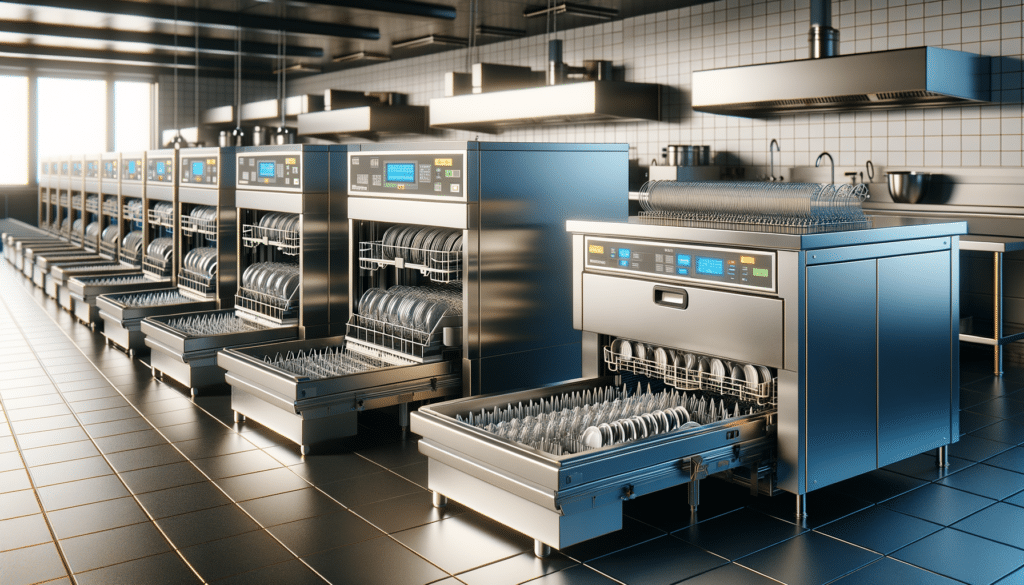Understanding the Different Types of Commercial Dishwashers
When it comes to commercial dishwashers, understanding the different types available can significantly impact your decision-making process. These appliances are essential in maintaining the efficiency and hygiene of any food service establishment, from small cafes to large restaurants. The three main types of commercial dishwashers are undercounter dishwashers, conveyor dishwashers, and door-type dishwashers. Each type offers unique features and benefits, catering to various operational needs.
Undercounter dishwashers are compact and ideal for smaller establishments or areas with limited space. They fit neatly under countertops, offering a seamless integration into kitchen layouts. Despite their size, they are highly efficient, handling a significant number of dish loads per hour. These machines are perfect for cafes, bars, and small restaurants where space is at a premium.
Conveyor dishwashers, on the other hand, are designed for high-volume operations. They have a continuous belt that moves dishes through the washing process, making them ideal for large restaurants, cafeterias, and institutions. Their ability to handle a vast number of dishes in a short time makes them indispensable in settings where speed and efficiency are crucial.
Door-type dishwashers, also known as hood dishwashers, are versatile and can handle a variety of dishware sizes. They are suitable for medium-sized operations, providing a balance between capacity and space efficiency. These machines are often used in restaurants with a moderate turnover of dishes, offering quick and thorough cleaning.
Understanding these types helps in selecting the right dishwasher that fits the specific needs of your establishment, ensuring operational efficiency and customer satisfaction.
Key Features to Consider When Choosing a Commercial Dishwasher
When selecting a commercial dishwasher, several key features should be considered to ensure it meets the demands of your business. These features not only affect the machine’s performance but also its long-term value and efficiency.
First, consider the capacity and size of the dishwasher. It is crucial to choose a model that can handle your peak times without causing delays. For instance, a conveyor dishwasher might be necessary for high-volume restaurants, while an undercounter model may suffice for smaller operations.
Energy efficiency is another critical factor. Energy-efficient models help reduce utility costs and are often more environmentally friendly. Look for dishwashers with high Energy Star ratings, which indicate lower energy and water consumption.
Ease of use and maintenance is also essential. Dishwashers with user-friendly controls and easy-to-clean components can save time and reduce the risk of operational errors. Consider models with self-cleaning features or those that require minimal manual intervention.
Durability and construction materials should not be overlooked. Stainless steel interiors and exteriors are preferable as they resist corrosion and can withstand the rigors of daily use. Investing in a durable model can save money in the long run by reducing repair and replacement costs.
Finally, consider the noise level of the dishwasher. In open kitchen environments, a quieter model can enhance the dining experience by minimizing disruption.
By carefully evaluating these features, you can select a commercial dishwasher that not only meets your current needs but also adapts to future demands, ensuring a sound investment for your business.
Cost-Saving Tips for Purchasing and Maintaining Commercial Dishwashers
Investing in a commercial dishwasher is a significant decision, but there are several strategies to make this purchase more affordable and cost-effective over time. Here are some practical tips to help you save money while ensuring you get a reliable and efficient appliance.
Firstly, consider energy-efficient models. Although they might come with a higher upfront cost, they can lead to substantial savings on utility bills. Energy-efficient dishwashers use less water and electricity, reducing operational costs significantly over time.
Explore financing options or leasing plans offered by manufacturers or suppliers. These options can ease the financial burden by spreading out payments, allowing you to manage cash flow better while acquiring a high-quality machine.
Regular maintenance is crucial in extending the lifespan of your dishwasher and preventing costly repairs. Implement a routine maintenance schedule that includes checking and cleaning filters, inspecting spray arms, and descaling to prevent mineral buildup. Regular maintenance not only ensures optimal performance but also reduces the likelihood of unexpected breakdowns.
Consider purchasing second-hand or refurbished models from reputable dealers. These units often come at a fraction of the cost of new ones and can be a great option for businesses on a tight budget. Ensure that any used machine is thoroughly inspected and comes with a warranty for peace of mind.
Finally, take advantage of bulk purchasing discounts if you are outfitting a new kitchen or replacing multiple units. Many suppliers offer discounts for bulk orders, which can lead to significant savings.
By implementing these cost-saving strategies, you can invest in a commercial dishwasher that meets your needs without compromising on quality or efficiency, ultimately enhancing your business’s bottom line.


